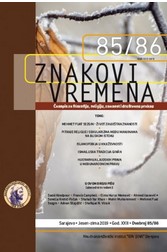In search of the ‘Divine’ in the ‘Details’ of Contemporary Art of Narration
In search of the ‘Divine’ in the ‘Details’ of Contemporary Art of Narration
Author(s): Shahab Yar KhanSubject(s): Religion and science , Comparative Study of Literature, Philosophy of Religion, Theory of Literature, British Literature
Published by: Naučnoistraživački institut »Ibn Sina«
Keywords: modern narratives; occupational category; pictorial details; New Atheism; Scientific Atheism; Richard Dawkins; Lawrence Krauss; Martin Amis; Evan McEwans; God as first principal of Diversity;
Summary/Abstract: Literature and life are interconnected realms of existence. These reflect in creating our perceptions of everyday reality. Understanding everyday reality involves a complex nexus of socio-cultural forces. Writers of these narratives always demonstrate certain personal commitments and at the same time certain amount of autonomy from commitments for their readers to enjoy multifaceted nature of ‘truth’. Work of art “is a filtered commodity” as it is characterized by the personal bias and prejudices of the artist. Writers of our age of information have a tendency to induce within a narrative element of pictorial details which result out of calculated surveys and organized scientific research. Writers’ scientific insight in to scientific atheism has given new dimensions to fiction and criticism in our age which need to be contrasted with traditional view of God as the first principle of diversity to understand the evolution of contemporary fiction. As a result of various perceptions evolving around a work of art more scientific means of evaluation are needed by the researchers; the scientific data, however, can be extremely misleading as well. Cognitive representations and strategies to circumvent ‘the combinatorial explosion’ lead to discourses in psychological understanding of fiction. There are psychological constraints on the process of constructing mental microworlds. Literary images as a result may appear diametrically opposite to the dominant understanding of the mainstream academia but at the same time possibilities of collaborative scientific understanding of literature also appear. It seems that in the world of literary studies in future the empirical descriptions and explanations of psychological and sociological process will be unavoidable.
Journal: Znakovi vremena - Časopis za filozofiju, religiju, znanost i društvenu praksu
- Issue Year: XXII/2019
- Issue No: 85/86
- Page Range: 105-118
- Page Count: 14
- Language: English

